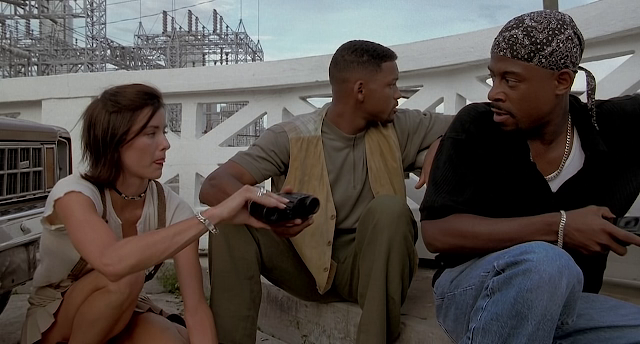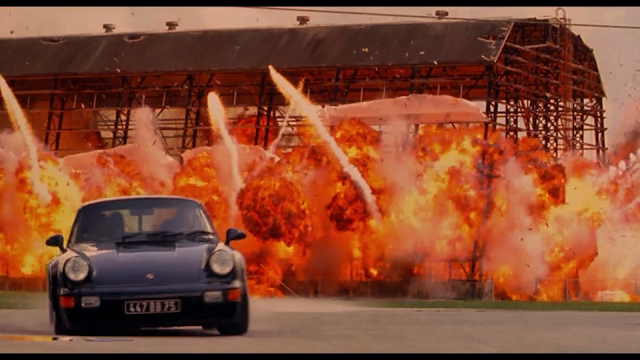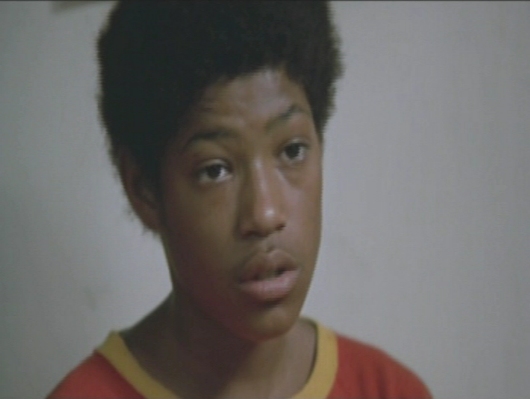Showing posts with label Bad Boys. Show all posts
Showing posts with label Bad Boys. Show all posts
Monday, April 6, 2015
Does Bad Boys hold up 20 years after its release?
What I said about Bad Boys as an "eye Teen Reviewer" for the San Jose Mercury News back in 1995 (April 14, a week after Bad Boys' April 7 opening, to be exact), word for word and with every single Merc style guide preference preserved, straight off a clipping I still have of my own article:
'Bad Boys' is fun — for a formula movie
EYE TEEN REVIEWER
Jim Aquino
THE cop-buddy comedy "Bad Boys" (not to be confused with the 1983 Sean Penn prison pic of the same name) is the latest flashy action movie from the Simpson-Bruckheimer assembly line, which has churned out such blockbuster hits as "Beverly Hills Cop" and "Top Gun."
Directed by Michael Bay, the genius behind the popular, Clio-winning "Aaron Burr?" milk commercial, "Bad Boys" sticks to the tried-and-true formula that made Don Simpson and Jerry Bruckheimer big-name producers back in the '80s: gaudy visuals, extravagant action sequences, a big-time soundtrack and a script that's high on concept and low on subtlety.
After producing a low-profile film such as the dark, dialogue-driven comedy "The Ref," it appears that Simpson and Bruckheimer want to go back to making big, dumb movies again. "The Ref" worked because it fit star Denis Leary's edgy, verbose persona, and never tried to soften Leary's cynical humor. "Bad Boys" could have been as satisfying as "The Ref," if its script were as clever overall as the snappy, entertaining interplay between its two leads, sitcom stars Martin Lawrence and Will Smith.
Lawrence and Smith, playing mismatched Miami police detectives Marcus Burnett and Mike Lowery, rise above the formulaic cops-vs.-heroin thieves plot to deliver top-notch performances. "Bad Boys" runs too long at more than two hours, but it remains watchable because of these charismatic, energetic stars and their fast, funny and often improvised delivery.
"Bad Boys," originally written for Dana Carvey and Jon Lovitz, is strong on visuals, thanks to first-time director Bay, who must have watched a lot of Tony Scott movies. The Miami setting is wonderful to look at, and the set pieces are well-staged.
But "Bad Boys" suffers from uninteresting bad guys and a story line that offers few surprises, aside from the amusing subplot in which neurotic family man Burnett and smooth ladies' man Lowery switch identities. Tea Leoni, who was so memorable as the sexy bohemian girlfriend on the short-lived sitcom "Flying Blind," plays a key witness.
"Bad Boys" isn't original or groundbreaking, but it's fun and entertaining, thanks to Lawrence and Smith.
What I think about Bad Boys in 2015, on the day before the date of the 20th anniversary of its release:
Of all the movie reviews I wrote for the Mercury News while in high school and then college, the mixed review of Bad Boys--at that point in his filmography, the Fresh Prince had just won over critics because of his big-screen debut in the film version of Six Degrees of Separation, but he hadn't made Independence Day yet--is one of the only two or three reviews where I still stand by every word. For instance, Michael Bay was at his best as a director of commercials like that classic "Got milk?" ad (although putting the words "Michael Bay" and "genius" in the same sentence back then makes me cringe); The Ref remains a terrific antidote to Yuletide mawkishness; and I still can't remember the name of Burnett and Lowery's boring nemesis. Like Dana Gould did when he couldn't remember the name of the villain Ben Gazzara played in Road House, I'm just going to call their boring nemesis Drago.
All the other reviews I wrote back then can go in the shredder. That was the biggest problem with being a film critic for print media. If some part of your opinion about a film would change (and my opinions sometimes do), you couldn't go back and change what you said in print like you can now easily do on a blog or in digital media.
Aside from a clunky and racist bit of attempted comedy where Shaun Toub--a.k.a. Dr. Yinsen from the first Iron Man flick--shows up as a stereotypical Middle Eastern convenience store clerk (an ominous sign of comedic things to come in Transformers: Revenge of the Fallen) who racially profiles Lawrence and Smith because of the visible guns in their holsters, Bad Boys remains one of Michael Bay's few tolerable movies. That's mainly due to the dialogue between Martin and Will ("Don't be alarmed, we're Negroes"), the most enduring part of the first Bad Boys, which cost only $17 million to make. I prefer smaller-scale Michael Bay over larger-scale, giant-robot-testicles-flashing Michael Bay, which is why I never bothered to watch 2003's much bigger-budgeted and longer-in-running-time Bad Boys II, even though Simon Pegg and Nick Frost were seen worshiping Bad Boys II in Hot Fuzz, an Edgar Wright film that trounces Bad Boys in all sorts of ways, simply because it's an Edgar Wright film (I hear 2013's Pain & Gain is supposed to be a return to Bay's smaller-budgeted roots, but I haven't seen that one yet either).
The Bad Boys original score by Mark Mancina still holds up too and hasn't aged poorly at all. During "AFOS Prime" and "Beat Box" on AFOS, you can hear a previously unreleased version of the film's dancehall-influenced main title theme, Mancina's "Prologue - The Car Jacking," taken from La-La Land Records' out-of-print Bad Boys score album and featured below. (The Bad Boys song album's not too shabby either. I remember practicing to get my driver's license to the sounds of Diana King's dancehall-style "Shy Guy.")
If you still find Bad Boys--or Drago--to be too generic for your tastes, perhaps reading Shield creator Shawn Ryan's mostly sardonic live-tweets of Bay's Bad Boys DVD commentary while he watched Bad Boys for the first time ever in 2012 will make the film go down easier. "Michael goes silent on commentary for a few minutes," tweeted Ryan, who actually likes the movie, during a lull in Bay's pontifi-bating. "Perhaps he took a break to write nasty email to Megan Fox."
Labels:
A Fistful of Soundtracks,
Bad Boys,
Dana Gould,
Denis Leary,
Edgar Wright,
film music,
Hot Fuzz,
Mark Mancina,
Martin Lawrence,
Michael Bay,
NSFW,
Road House,
Shawn Ryan,
The Ref,
Transformers,
Will Smith
Monday, June 8, 2009
Nothing but net: Favorite basketball movie scores
Basketball fans are currently swept up in NBA Finals Fever, so it's the perfect time to look back at how film and TV composers have musically interpreted the game in three of the best basketball movie scores.
Hoosiers (Jerry Goldsmith)
I'm waiting for Superbad soundtrack musicians Bootsy Collins, Bernie Worrell, Clyde Stubblefield, John "Jab'o" Starks and Phelps "Catfish" Collins to reunite for that great funktastic basketball comedy score that hasn't been written yet. I doubt the funk legends will collaborate again for a movie score, but if this dream team did so for my dream basketball flick score, the result would probably end up going neck-and-neck with Jerry Goldsmith's beloved work from 1986's Hoosiers for the spot of greatest b'ball score.
Goldsmith preferred to approach period pieces like Hoosiers (known as Best Shot outside America), Chinatown and L.A. Confidential as if they were contemporary. On paper, a partially synthesized, anachronistic score for a movie set in the early '50s reads like an epic fail. Somehow, Goldsmith made it work. His musical vision of basketball-as-Americana, which combined a full orchestra with drum machines, doesn't sound dated.
(On the other hand, the completely synthesized "Theme from Hoosiers" concert arrangement that Goldsmith and his son Joel created specially for the soundtrack album is on the dated side. When I first heard that track several years ago, I thought it sounded like theme music for a huffing and puffing T.J. Hooker in an LCPD gym, attempting to block a shot with his beer gut.)
I always dug how Goldsmith's percussion, like in "The Coach Stays" and the Aaron Copland-esque "The Pivot," imitated the sound of a basketball being dribbled.
Goldsmith and Hoosiers director David Anspaugh later reteamed for Rudy, another rousing sports flick that turns grown men into teary-eyed Oprah's Favorite Things audience members. The Goldsmith/Anspaugh partnership produced two powerful and rich scores that even someone who's not a sports fan can appreciate.
Back to that unwritten funkdafied basketball flick score. If I composed it, it would probably sound like "Sportscaster," which Freaks and Geeks and Donnie Darko composer Michael Andrews (a.k.a. Elgin Park) wrote for his band, the Greyboy Allstars.
Cornbread, Earl and Me (Donald Byrd)
Below CBSSports.com's Movie Madness list of Top 10 Basketball Movies, a commenter says the early Laurence Fishburne movie Cornbread, Earl and Me belongs on the list simply because of the Blackbyrds theme song ("He's a man with the plan/He's got a basketball in his hand!").
 Cornbread contains the only film score written by jazz-funk legend Donald Byrd. The Blaxploitation.com review of the Cornbread soundtrack says "it's not up to the standard of their early studio LPs," but I'll take the Byrd & the Blackbyrds sound any day over a James Horner interpretation of the drama both on and off the court.
Cornbread contains the only film score written by jazz-funk legend Donald Byrd. The Blaxploitation.com review of the Cornbread soundtrack says "it's not up to the standard of their early studio LPs," but I'll take the Byrd & the Blackbyrds sound any day over a James Horner interpretation of the drama both on and off the court.Glory Road (Trevor Rabin featuring Alicia Keys)
The only Bruckheimer movie scores I've liked are from Beverly Hills Cop (Harold Faltermeyer), Bad Boys (Mark Mancina), Crimson Tide (Hans Zimmer), The Rock (the Media Ventures Mafia) and Remember the Titans (Trevor Rabin). The score from Bruckheimer's basketball flick about the first integrated NCAA team, the 1965-66 Texas Western Miners, which unites Titans' Rabin with Alicia Keys, isn't too shabby either.
The former Yes-man was no stranger to the sport. He wrote both the NBA on TNT theme and the Coach Carter score.
Other noteworthy basketball movie scores: Hoop Dreams (Ben Sidran), White Men Can't Jump (Bennie Wallace), Love & Basketball (Terence Blanchard), Coach Carter (Rabin), Inside Moves (John Barry), The Fish That Saved Pittsburgh (Thom Bell) and Fast Break (David Shire and James Di Pasquale).
He Got Game doesn't count because other than a theme tune performed by Public Enemy, there's no original music during the movie. Spike Lee used Copland pieces for the score to reflect his Goldsmith-like vision of hoops-as-Americana.
(Is Theodore Shapiro's Semi-Pro score any good? I haven't watched Semi-Pro yet.)
On the small screen, inner-city high school basketball served as the backdrop for The White Shadow, which featured a theme from Rockford Files and A-Team composers Mike Post and Pete Carpenter at the height of their partnership.
No discussion of basketball-related original score music would be complete without the most famous tune of them all, "Roundball Rock," the now-retired NBA on NBC theme. Forget the Gatorade "Be Like Mike" jingle that's synonymous with Michael Jordan. "Roundball Rock" is the theme for His Airness. It was composed by New Age musician and frequent Late Night with Conan O'Brien punching bag John Tesh, who didn't have access to a piano at the time he wrote it, so he had to sing it into his own answering machine.
Related links:
Hoosiers score CD review and release history [Filmtracks]
"THE 'REEL' DREAM TEAM" [High Socks Legend]
"That Guy Salute: The Coach in Teen Wolf" [Intensities in Ten Suburbs]
Subscribe to:
Posts (Atom)





